Lithium-ion batteries are the best option for most home solar systems due to their efficiency, compact size, and longer lifespan. The most popular solar batteries are lithium iron phosphate (LFP). However, NMC batteries are a great choice as well.
Even though solar energy continues to gain popularity, most Australian households don’t have solar battery storage installed. However, with the recent federal and state battery rebates being introduced, and solar feed-in tariffs continuing to decrease, more and more households are looking to add a battery to their system.
Several factors come into play when considering the best type of battery for a home solar system in Perth. Understanding the intricacies of solar storage is essential for making an informed decision. Let’s dive into the different types of batteries available and which ones might be the best suited for your home solar system needs.
Factors to Consider When Choosing a Battery
Choosing the right battery for your solar system involves understanding your specific energy needs, budget constraints, and environmental conditions. The right choice of battery can protect you against power outages and provide substantial savings. Some factors to consider include:
- Storage Capacity: Determine the amount of energy you consume to choose a battery that meets your demand. Solar battery capacity is measured in kilowatt-hours (kWh), which indicates how much energy the battery can store.
- Cycle Life: Consider how many charge and discharge cycles a battery can handle before needing replacement. A longer lifespan means better long-term value.
- Efficiency: Choose a battery that will effectively convert and store energy. Round-trip efficiency measures how much energy is lost during the charge and discharge process. Higher round-trip efficiency means less energy wasted.
- Cost: Balance upfront costs with long-term savings and ROI. Factor in the potential savings of electricity plus any government incentives.
- Compatibility: If you already have a solar panel system installed, consider how the battery will integrate with your current system and monitoring.
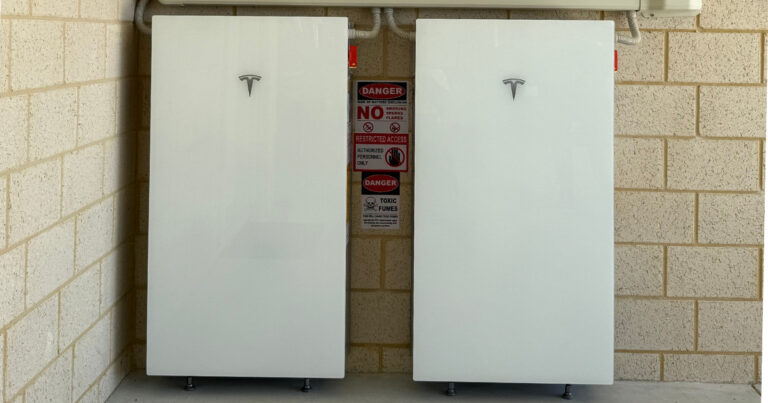
Types of Solar Batteries:
Lithium-Ion Batteries
Lithium-ion batteries are currently the most popular choice for homeowners, owing to their efficiency and long lifespan. A majority of the home batteries currently available on the market are lithium. They have a high energy density, meaning they can store more energy in a smaller space than other batteries. This makes them remarkably efficient for residential use, especially where space is a premium. Lithium-ion batteries are also known for their fast-charging capabilities, making them an excellent option for those who consume significant power during peak hours.
Moreover, lithium-ion batteries require less maintenance than alternatives and are built to last, often coming with warranties of up to 10 years. They’re also safer, with built-in management systems to prevent overheating and overcharging, thereby reducing risks associated with battery failures.
The main disadvantage of lithium-ion batteries is their initial cost, which tends to be higher than other battery types. However, this expense is often offset by their longevity and superior performance over the years.
Types of Lithium-ion Batteries
There are two main types of lithium-ion batteries: Lithium Iron Phosphate (LFP) and Nickel Manganese Cobalt (NMC). LFP batteries have a longer lifespan and greater safety than NMC batteries, making them ideal for residential storage systems. On the other hand, NMC batteries offer high energy density and faster charging, making them a better fit for households needing electric vehicle charging.
The SolarEdge Home Battery uses NMC technology, while many other brands like Sungrow, BYD and the new Tesla Powerwall 3 use LFP. It’s often highlighted that LiFePO batteries are the safest option because they are more resistant to combustion.
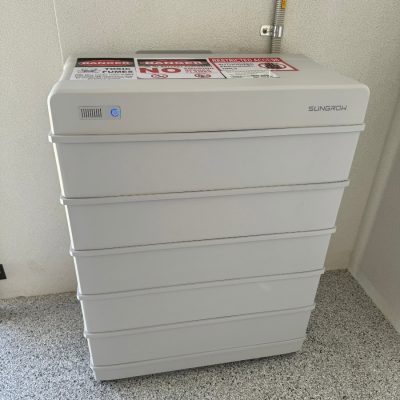
Lead-Acid Batteries
Despite being an older technology, Lead-acid batteries are an older technology but remain a popular choice for off-grid systems due to their cost-effectiveness. Unfortunately, lead-acid batteries come with several downsides. They are bulkier and heavier than lithium-ion batteries and often require more space for installation. Their lifespan is relatively shorter, and they require regular maintenance to ensure optimal performance. Additionally, they have lower energy density and efficiency compared to lithium-ion batteries, which can be limiting for on-grid residential use.
Flow Batteries
Flow batteries first emerged as an innovative choice for homes needing extensive energy storage. They can be cycled thousands of times without significant degradation, offering an incredibly long lifespan. However, the higher cost and complexity associated with flow batteries made them difficult for some homeowners. Their installation process can be intricate, and they are generally more suited for industrial use or large-scale storage rather than individual residential systems.
What’s the Best Battery for an Existing Solar System?
If you already have a PV system installed at your home, there are two battery options that will fit your system, depending on your setup. Most existing solar systems will require an AC-coupled battery. These all-in-one batteries have a built-in inverter that allows them to convert the AC power from your solar panels into back into DC to store in the battery.
Some popular AC-coupled batteries are:
- Sigenergy
- Tesla Powerwall
If you’ve installed a battery-ready system with a hybrid solar inverter, you can use a DC-coupled battery. These batteries are generally from the same manufacturer as your inverter, offering a more integrated solution. DC-coupled batteries are also cheaper to install as there are fewer components involved.
Some popular DC-coupled batteries are:
- SolarEdge
- BYD
- Sungrow
Solar Battery Comparison
Here are some quality batteries we recommend for homeowners looking to install a solar battery system.
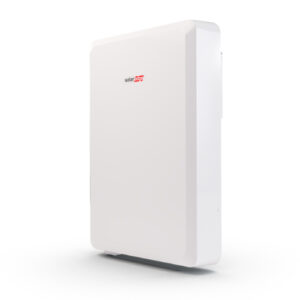
Model: Home Battery
AC-coupling Support: No
Chemistry: Nickel Manganese Cobalt (NMC)
Size: 9.7kWh
Scalable: Yes (Up to 3 batteries per inverter)
Warranty: 10 Years
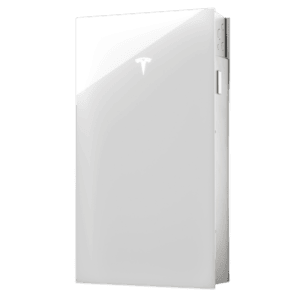
Model: Powerwall 3
AC-coupling Support: Yes
Chemistry: Lithium Iron Phosphate (LiFePO4)
Size: 13.5kWh
Scalable: Yes (Up to 4 Powerwall units)
Warranty: 10 Years
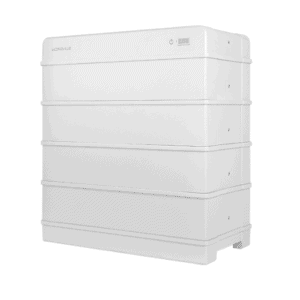
Model: SBR HV
AC-coupling Support: No
Chemistry: Lithium Iron Phosphate (LiFePO4)
Size: 6.4 kWh – 19.2 kWh
Scalable: Yes (2-6 stackable modules, 4 unit stacks can be wired together)
Warranty: 10 Years
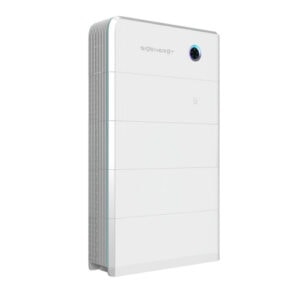
Model: SigenStor
AC-coupling Support: Yes
Chemistry: Lithium Iron Phosphate (LiFePO4)
Size: 5 kWh – 48 kWh
Scalable: Yes (1-6 stackable modules)
Warranty: 10 Years
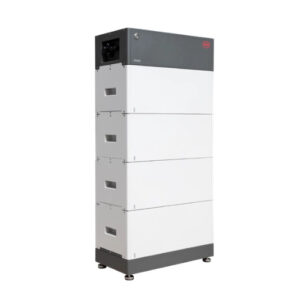
Model: Battery-Box LV
AC-coupling Support: No
Chemistry: Lithium Iron Phosphate (LiFePO4)
Size: 4 kWh – 24 kWh (single tower)
Scalable: Yes (2-6 stackable modules, connect up to 64 modules)
Warranty: 10 Years
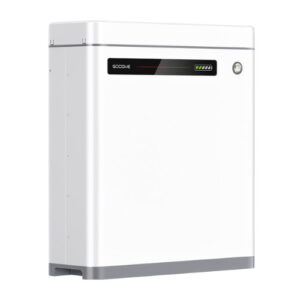
Model: Lynx Home U Battery
AC-coupling Support: No
Chemistry: Lithium Iron Phosphate (LiFePO4)
Size: 4.8 kWh (stackable units)
Scalable: Yes (1-6 stackable modules)
Warranty: 10 Years
Need Help Choosing a Battery?
Selecting a battery for your home solar system is crucial for maximising the benefits of solar power. While these are our recommendations for the best quality batteries, they might not be the best fit for every situation.
At Perth Solar Force, our team carefully assess your specific energy requirements, budget, and long-term goals to help find the best choice in solar battery storage for you. Whether installing a new system or upgrading an existing one, consulting with professional solar providers can offer expert advice and ensure that your solar power system is tailored to meet both your immediate and future energy needs. So if you’re looking at installing a solar battery for your home, get in touch with Perth Solar Force. We’ll help design a system that is fit for purpose according to your home and family needs.
